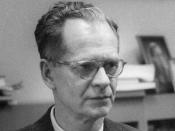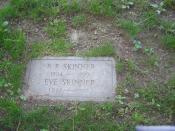B.F. Skinner was one of the important figures in the field of behaviorism. Initially, Burrhus Frederic (B.F.) Skinner majored in literature at Hamilton College in New York. He went to New York City in the late 1920s to become a writer, but he was not successful. "I had nothing important to say," (Vargas, 2006) he later explained. So, he decided to go back to school, and went to Harvard to study psychology, since he had always enjoyed observing animal and human behavior. For the most part, the psychology department there was immersed in introspective psychology, and Skinner found himself more and more a behaviorist. Behaviorist B.F. Skinner added many contributions to the field of psychology of personality due to several occurrences during his lifetime. Many of Skinner's theories can be applied to the workplace as well.
Skinner, the BehavioristBehaviorism originated with the work of John B. Watson, an American psychologist.
Watson claimed that psychology was not concerned with the mind or with human consciousness. Instead, psychology would be concerned only with behavior. In this way, people could be studied objectively, like rats and apes. Burrhus Frederic Skinner was also an American psychologist and an influential exponent of behaviorism, which views human behavior in terms of responses to environmental stimuli and favors the controlled, scientific study of responses as the most direct means of elucidating human nature. Skinner made his reputation by testing Watson's theories in the laboratory. Skinner's studies led him to reject Watson's almost exclusive emphasis on reflexes and conditioning. People respond to their environment, he argued, but they also operate on the environment to produce certain consequences. This and more of Skinner's theories, studies and experiments contributed to the field of psychology of personality.
ContributionsB.F. Skinner worked in the lab of an experimental biologist, however, and developed...


